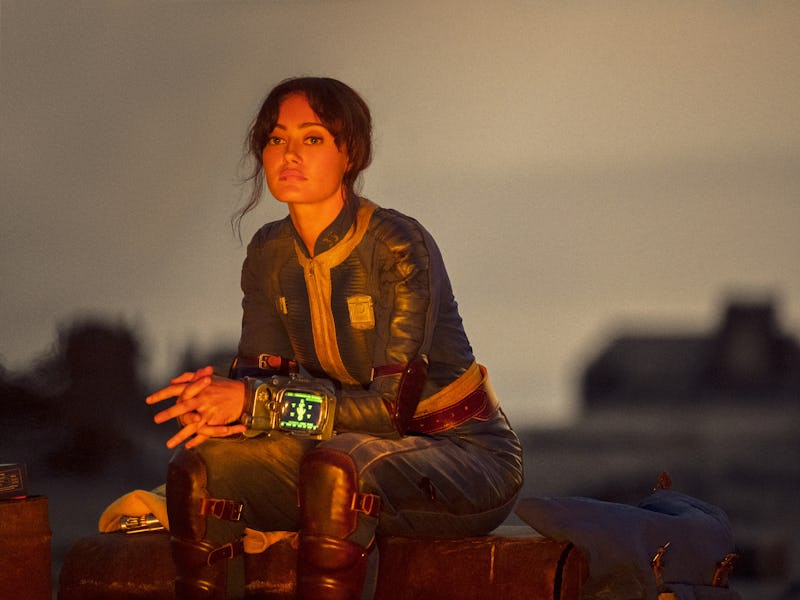
Those who are chronically online may have picked up on the recent controversy surrounding Prime Video’s Fallout series and the franchise’s greater canon. The concern? That events in the show are retconning the non-Bethesda entries in the video game series (Fallout, Fallout 2 and Fallout: New Vegas).
The Fallout TV series is set in the year 2296: nine years after the events in Fallout 4 (2287), and 15 years after New Vegas (2281). In episode 5, the audience learns that the city Shady Sands was nuked to smithereens in (or possibly just after) 2277. Shady Sands is significant in the game lore for two reasons: one, it is typically the first non-Vault location that players encounter in the original Fallout, and two, it serves as the birthplace for the New California Republic (NCR), the “good guy” faction in Fallout 2 and New Vegas.
RIP Shady Sands.
At its core, the outrage stems from a feeling of betrayal. Shady Sands is such an important location in the Fallout lore that blowing it up was going to stir some feelings. Adding to the controversy, critics of the TV series point to seeming contradictions with the New Vegas timeline (since no one in the NCR is too concerned with their capital city having become a crater). That, and the shot of a seemingly deserted New Vegas skyline at the show’s end, have left some decrying that this is some great Bethesda erasure conspiracy. (For the record, Bethesda Daddy Todd Howard has long been a vocal supporter of Obsidian’s entry in the franchise.)
Putting aside unsubstantiated claims that Bethesda fears New Vegas because it was just that darn good, this concern over a franchise’s sanctity of canon raises interesting questions about intertextuality in the digital age. In a video game franchise that prides itself on player freedom, what does canon even mean? What expectations should we have for a linear TV story based on a video game series designed to be non-linear?
Each Fallout game features different endings based on player decisions. Some of those decisions are large, like committing genocide by poisoning the water supply, while others are small, like having sexual relations with a mob boss’s wife without having a condom in your inventory (whoops!), resulting in an unplanned progeny. These different outcomes couldn’t possibly be reconciled into a singular fictional history, so the franchise has always compromised by picking certain player actions as “canon” over other options. To keep cognitive dissonance to a minimum, each new game is typically set in a new part of the Wasteland at a different point in the timeline.
No, this is not a Bethesda erasure conspiracy.
Back in November, Howard told Vanity Fair that the Prime Video show fit within the existing lore, but wouldn’t directly adapt plot from the games, adding, “I did not want to do an interpretation of an existing story we did… I was interested in someone telling a unique Fallout story.” The problem this poses, however, is that the series needs to also relate to the video games to feel relatable and authentic. Showrunners Graham Wagner and Geneva Robertson-Dworet achieved this by crafting an original story set in the same location as the original Fallout, but at a different point in time chronologically.
By reusing familiar territory from its source material, Prime Video’s Fallout grounds the narrative for existing fans. This allows the adaptation’s plot to introduce new elements—the vault trio, Lee Moldaver (Sarita Choudhury) etc.—alongside familiar ideas like the Enclave, the NCR, and the Brotherhood of Steel. It also means that new ideas in the show would have ramifications for the lore. Are the games so precious that any idea spun from them is sacrosanct?
The show also meaningfully contributes to the existing lore. Not only is the overall Fallout story extended forward into the future, and also backward into the past: Cooper Howard’s (Walton Goggins) memories provide a whole new look at pre-war America. Players get to see the bombs fall in Fallout 4, but we never get to explore the pre-war world outside Sanctuary Hills (unless you count the Operation: Anchorage DLC). The Vault-Tec reveal at the show’s end is a rich and satisfying plot twist. The TV format serves this kind of storytelling well.
The franchise’s loose canon gives the Amazon show license to get creative — and it should.
If the Fallout franchise has a catchphrase, it’s “war… war never changes.” It’s the one true constant of all the games, spoken at the beginning of each. Even Vault-Tec evolved over time, getting retconned in Fallout 2 to be a nefarious organization. Ultimately, whether the show does or doesn’t change the New Vegas timeline is redundant. It’s unreasonable to expect Fallout to maintain a meticulous canon when the player experience is designed to differ based on player choices. Prime Video’s TV series is an adaptation — we should expect it to change things.